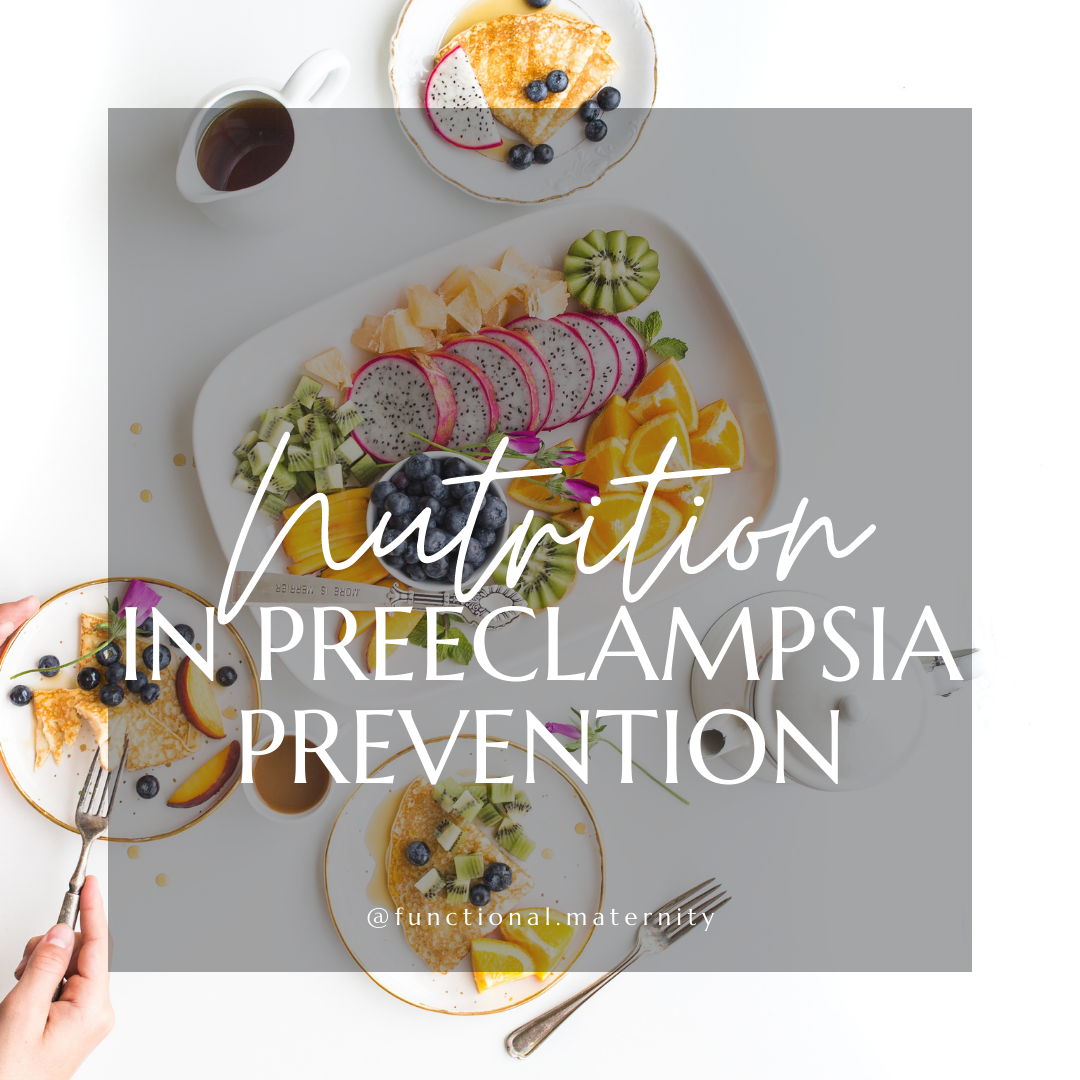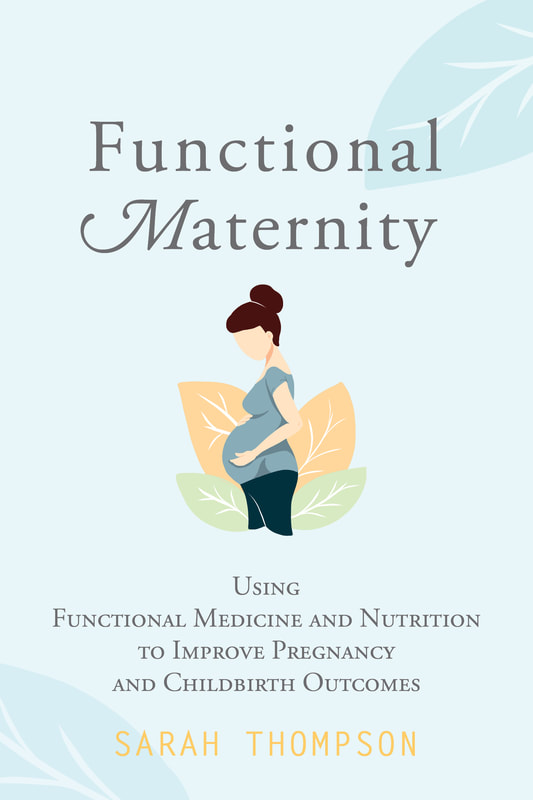There have been several studies linking different nutritional deficiencies with an increased risk of developing gestational hypertension and preeclampsia. In this article I will address the individual nutrients linked in these studies, as well as nutritional principles that can help prevent, slow and support preeclampsia presentations. Symptoms can include:
It is a serious condition, but there are ways to lessen the incident. There is research that supports nutritional deficiencies to play a role in the onset of the disease Vitamin B2 - RiboflavinIt was once theorized that pre-eclampsia was a disease born from a B complex deficiency. Riboflavin is a coenzyme needed to catalyze the chemical reactions in the body, specifically those necessary for the growth of the nerves, brain, and muscles of the fetus. Symptoms of riboflavin deficiency mimic many other nutrient deficiencies, making it difficult to diagnose - anemia, dry/cracking lips/nose/mouth, magenta red tongue, and skin rashes. Studies have found a direct connection between riboflavin and preeclampsia. The mechanism is associated with the FAD riboflavin derived cofactor associated with mitochondrial function, oxidative stress, and nitric oxide production. The FAD cofactors are lower in women with preeclampsia...and so is oxidative stress, which has been shown to be driving factor in preeclampsia. Riboflavin has also been successfully used in clinical treatment. Studies show that high dose riboflavin supplementation is successful in reducing hypertension in preeclamptic women. Vitamin B5 - Pantothenic AcidB5-pantothenic acid is essential in the formation of red blood cells, sex hormones, and the regulation of stress hormones. It is also necessary for the absorption of riboflavin, so if you are deficient in pantothenic acid, you will become deficient in riboflavin. Vitamin B6 - PyridoxineB6 is a cofactor for enzymatic reactions that affect the metabolism of proteins, fats, glycogen, and Nucleic Acid (DNA/RNA), as well as in the integrity of blood vessel walls. B6, B12, and B9 (folate) are necessary for the proper breakdown of homocysteine. Elevated homocysteine along with deficiencies in pyridoxine, folate and cobalamin are associated with preeclampsia. These two factors increase cardiovascular inflammation, oxidative stress and decrease the ability of the body to functionally push blood through the vessels, increasing hypertension. Vitamin B9 - FolateLike I mentioned above, folate is important for the methionine cycle that breaks down homocysteine and produces the methyl donor SAMe. The use of folic acid in supplementation has been the preferred method for decades. Newer studies are showing the inadequacy of the functional value of these supplements, and a better response from dietary folates. A 2015 study compared the severity of preeclampsia between non-folate consumers, folic acid consumers, and dietary folate consumers. What they found was the folic acid consumers has the same risk of severity of preeclampsia as non-folate consumers. In contrast, dietary folate intake was associated with a significant decrease in severe preeclampsia symptoms, but not mild symptoms. Vitamin B12 - CobalaminCobalamin along with folate and pyridoxine help to break down homocysteine. Dysfunctions in the methionine pathway and the increase in homocysteine is related to preeclampsia. There is quite a commotion around the MTHFR gene and mutations that limit the cells' ability to methylate folate.... but there are so many more genes in the process of breaking down homocysteine. Some of these genes produce enzymes that need cobalamin to function. In addition, many of the symptoms of HELLP syndrome mimic cobalamin deficiency and symptoms of cobalamin deficiency mimic HELLP syndrome. Vitamin DThe role of Vitamin D in hypertension is still not fully understood, but we know there is a connection between low Vitamin D preeclampsia. There is an interesting correlation between winter pregnancies (lack of sunlight) and pre-eclampsia rates. Vitamin D is necessary in the formation of several enzymes produced by the placenta, which are missing in preeclampsia. A 2017 study found a protective link between vitamin D and preeclampsia, in that it reduced the risk of recurrent preeclampsia in women who had already had a preeclampsia in a previous pregnancy. Vitamin KVitamin D and K work together, and in combination with Calcium, Magnesium and Potassium. (More on those below) Vitamin K2 is a fat-soluble vitamin that is produced through bacterial fermentation (either in the form of cultured food products, or by our digestive bacteria in our guts), or in cultured dairy products and bone marrow (bone broth). Its role in the body is only just starting to be understood. Blood clotting issues in the placenta have been theorized to be a cause of preeclampsia progression. Preeclampsia is associated with low concentrations of protein Z. Protein Z is a plasma protein that regulates coagulation. We think of vitamin K as a nutrient that helps to prevent hemorrhaging, but what it really does is regulate blood clotting. Women with preeclampsia have lower concentrations of protein Z, which could be associated with a deficiency in vitamin K, and thus have issues with coagulation. Therefore blood clotting postpartum is more common in women with preeclampsia as well. CalciumCalcium has long been associated with the progression of pre-eclampsia and HELLP syndromes. While most of the nutrients we are talking about work in prevention of preeclampsia from early gestation, in subsequent pregnancies, or are found deficient in preeclampsia women, calcium is the only nutrient (so far) that has been shown to reduce acute symptoms according to Cochrane. Calcium regulates the hormones that function on the arteries (tightening and relaxing), and thus regulates blood pressure. In order to work properly, there must be enough Magnesium. MagnesiumMagnesium is crucial to a healthy pregnancy. Not only is it necessary for many of the other nutrients, like calcium, sodium, and potassium, to function properly, but it is also necessary for the hormone receptors to accept certain hormones. Without proper levels of magnesium, sodium and calcium build up in the blood causing increased blood pressure and increasing the risk of preeclampsia. Magnesium is a natural muscle relaxant, and deficiency can cause tightening of the blood vessels. Magnesium deficiency is also associated with increased anxiety and stress management symptoms. Most women I come across are magnesium deficient. Newer studies are linking magnesium deficiency, to the etiology of preeclampsia. Although acute supplementation doesn't decrease symptoms. Magnesium deficiency in the phases of gestation in which the placenta needs adequate amounts to develop properly poses the greatest effect. Addressing symptoms of magnesium deficiency earlier in pregnancy could help decrease the risk of poor placental development and function. CoEnzymeQ10Oxidative stress is seen in preeclampsia women. During pregnancy serum levels of CoQ10 rise throughout pregnancy in conjunction with rises in cholesterol levels. Studies have theorized that this rise in maternal CoQ10 is protective against oxidative stress and helps to balance the inflammatory effects of late gestation metabolic changes and hormones. A 2003 study found a marked decrease in CoQ10 in women with preeclampsia. The theory is that increasing oxidative stress, “consumes” the CoQ10, and decreases mitochondrial function. Interestingly this difference is more prominent in women living at altitude than women living at sea level. Copyright © 2021 Functional Maternity, All rights reserved. The content in this article is not intended to be a substitute for professional medical advice, diagnosis, or treatment. Always seek the advice of your physician or other qualified health provider with any questions you may have regarding your medical condition.
0 Comments
Leave a Reply. |
Hi There!I'm Sarah Thompson, a Certified Functional Medicine Practitioner who specializes in Maternal, Prenatal and Childbirth health. I'm also the author of Functional Maternity, and the upcoming book Beyond Results - A practitioner's Handbook to Effective Functional Lab Analysis in Pregnancy. Purchase BookArchives |





 RSS Feed
RSS Feed